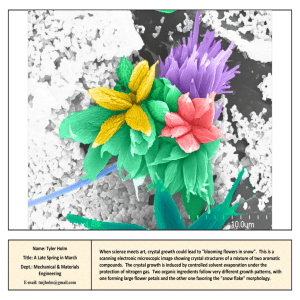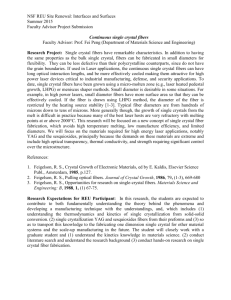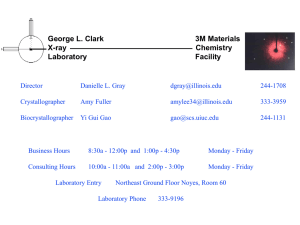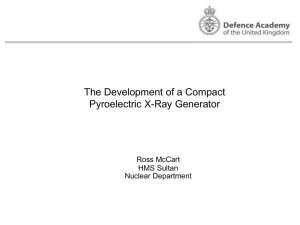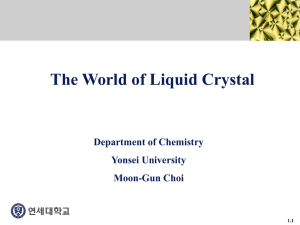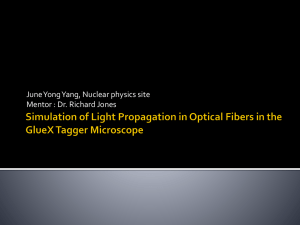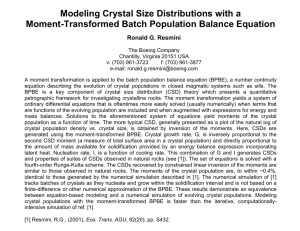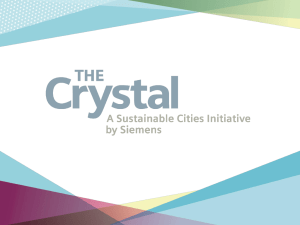1 Crystal Fiber R&D - Indico
advertisement
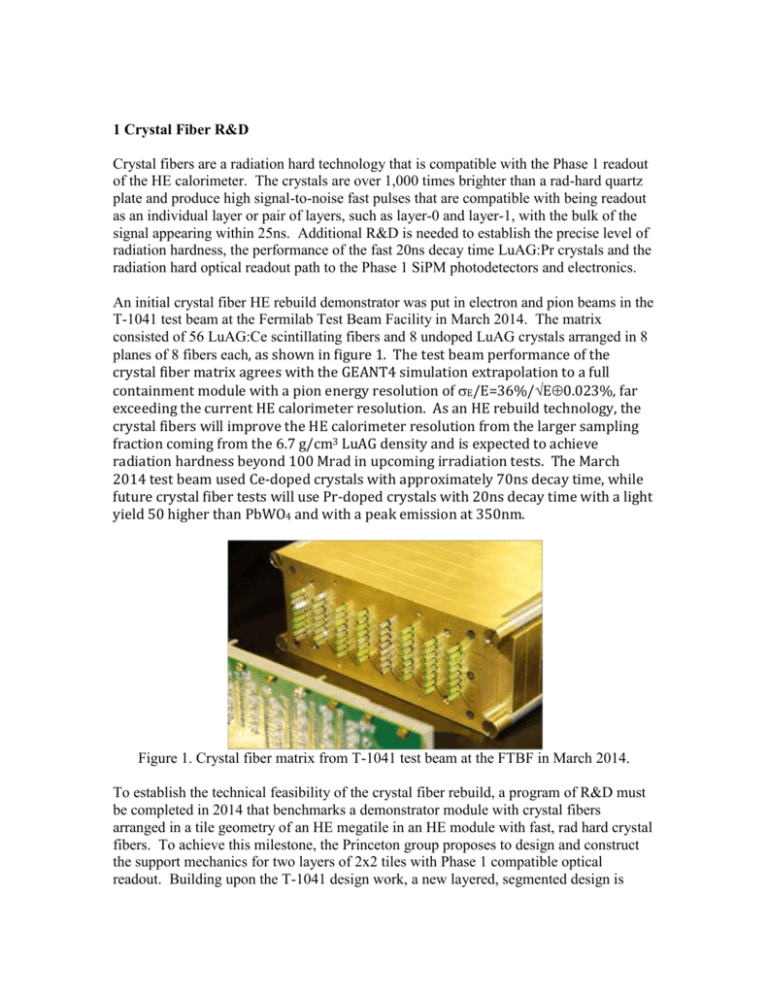
1 Crystal Fiber R&D Crystal fibers are a radiation hard technology that is compatible with the Phase 1 readout of the HE calorimeter. The crystals are over 1,000 times brighter than a rad-hard quartz plate and produce high signal-to-noise fast pulses that are compatible with being readout as an individual layer or pair of layers, such as layer-0 and layer-1, with the bulk of the signal appearing within 25ns. Additional R&D is needed to establish the precise level of radiation hardness, the performance of the fast 20ns decay time LuAG:Pr crystals and the radiation hard optical readout path to the Phase 1 SiPM photodetectors and electronics. An initial crystal fiber HE rebuild demonstrator was put in electron and pion beams in the T-1041 test beam at the Fermilab Test Beam Facility in March 2014. The matrix consisted of 56 LuAG:Ce scintillating fibers and 8 undoped LuAG crystals arranged in 8 planes of 8 fibers each, as shown in figure 1. The test beam performance of the crystal fiber matrix agrees with the GEANT4 simulation extrapolation to a full containment module with a pion energy resolution of E/E=36%/E0.023%, far exceeding the current HE calorimeter resolution. As an HE rebuild technology, the crystal fibers will improve the HE calorimeter resolution from the larger sampling fraction coming from the 6.7 g/cm3 LuAG density and is expected to achieve radiation hardness beyond 100 Mrad in upcoming irradiation tests. The March 2014 test beam used Ce-doped crystals with approximately 70ns decay time, while future crystal fiber tests will use Pr-doped crystals with 20ns decay time with a light yield 50 higher than PbWO4 and with a peak emission at 350nm. Figure 1. Crystal fiber matrix from T-1041 test beam at the FTBF in March 2014. To establish the technical feasibility of the crystal fiber rebuild, a program of R&D must be completed in 2014 that benchmarks a demonstrator module with crystal fibers arranged in a tile geometry of an HE megatile in an HE module with fast, rad hard crystal fibers. To achieve this milestone, the Princeton group proposes to design and construct the support mechanics for two layers of 2x2 tiles with Phase 1 compatible optical readout. Building upon the T-1041 design work, a new layered, segmented design is needed for 10cm wide tiles constructed of 25 2mm diameter fibers with 4mm spacing. A mechanically stable optical coupling must be developed between the crystal fibers arranged in HE megatile planes and a wavelength-shifter coated rad hard optically transparent core, potentially made form undoped LuAG fiber. The arrangement of 8 tiles with 8-way 2mm diameter clear fiber connectors will be directly readout with a Phase 1 SiPM package and will contain a combination of LuAG:Ce, undoped LuAG, and LuAG:Pr crystals produced by companies and university labs working directly with CERN and Lyon on crystal fiber production. The same production team will produce designs for a cost-effective scaling of the crystal fiber production needed for a two year production of fibers for the HE rebuild. REQUEST FOR PROPOSAL 1) University Occupational Title: Mech. Engineer / William Sands 2) Base Salary: $ 122,700 for 12 months 3) Hourly Rate: $ 63.90, % Effort 2 4) Total No. of Hours to work on Project: 40 5) Unloaded Total (without fringe or indirect costs): $ 2500 6) Fringe Benefits: $ 843, % rate 33.7 7) Indirect Costs: $ 1525, % rate 61 Loaded Total Cost: $ 4,868 Period of Performance: Start Date 10/1/13 End Date 12/31/14 1) University Occupational Title: Mech. Technician / Matthew Komor 2) Base Salary: $ 51178 for 12 months 3) Hourly Rate: $ 26.66, % Effort 4 4) Total No. of Hours to work on Project: 80 5) Unloaded Total (without fringe or indirect costs): $ 2250 6) Fringe Benefits: $ 758 % rate 33.7 7) Indirect Costs: $ 1373 % rate 61 8) Loaded Total Cost: $ 4,381 Period of Performance: Start Date 10/1/13 End Date 12/31/14 Materials & Supplies (M&S): HE Megatile Crystal Fiber Support - Material & Supply Costs: $ 3900 Optical Interface Mechanics - Material & Supply Costs: $ 2100 Total – M&S Costs: $ 6000 Travel: CERN H2 Test Beam Travel: $2,800 per trip per person, two trips Total – Travel: $ 5,600 Total Request fro Crystal Fiber R&D: $ 20,849
